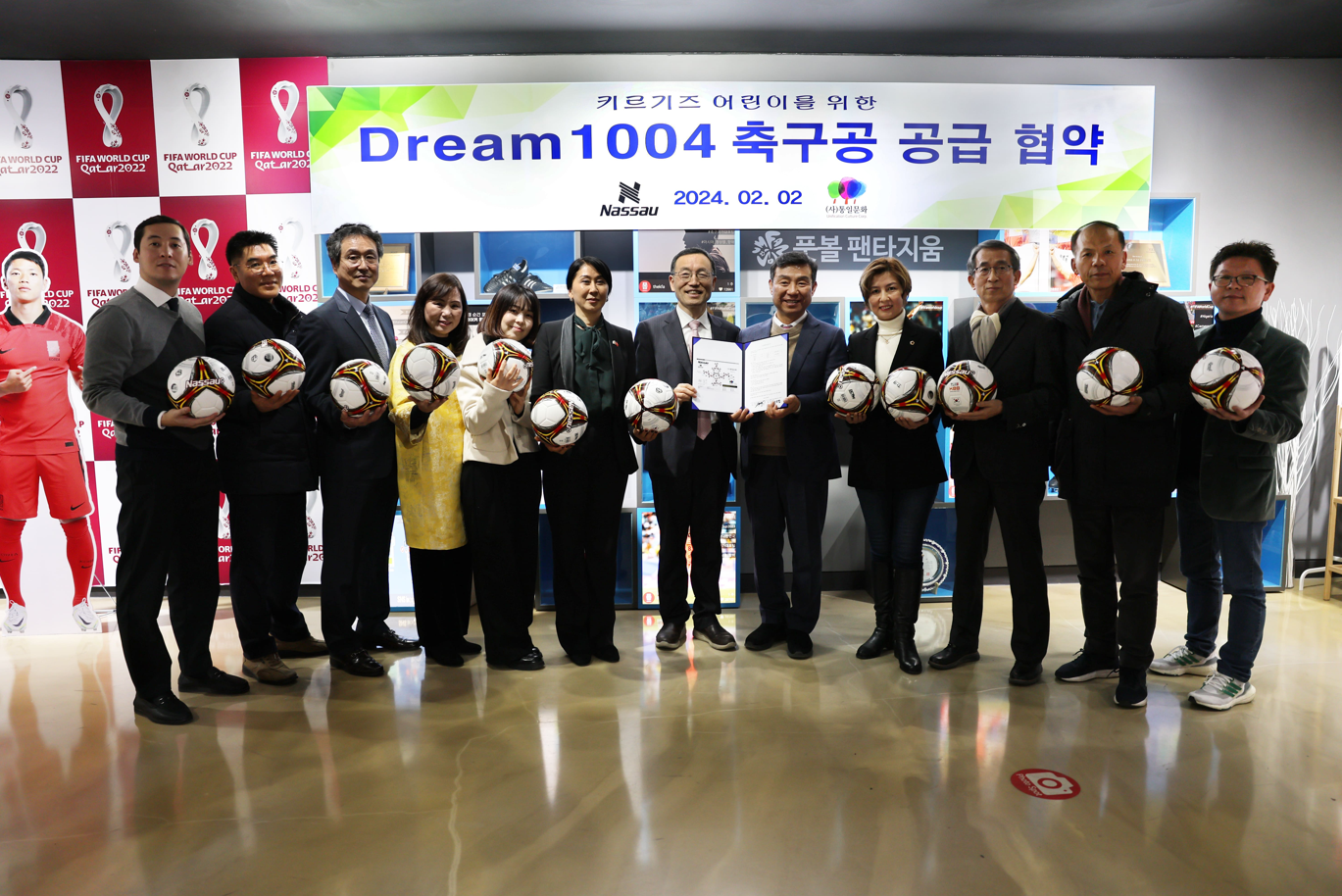NEWS
| Title | (Association) Unification Culture Signs Agreement with Nassau to Supply 1,004 Soccer Balls to Kyrgyz Children |
| Content |
February 3, 2024
[Nanum Ilbo = Reporter Kang Hyun-ah] The key initiative of the “DREAM 1004 Project,” promoted by the Association for Unification Culture (President Lee Sang-yeop), which aims to provide dreams, hope, and courage to children in Kyrgyzstan, is the donation of 1,004 soccer balls (including 251 air pumps). A supply agreement for the "1004 Soccer Balls" was signed with Nassau Co., Ltd. on February 2 at the Football Fantasium located inside Sangam World Cup Stadium. President Lee, who hosted the event, emphasized the significance by stating, “Unlike many other cases of overseas relief supplies, this project of sending soccer balls with heartfelt sincerity to the children of a single country is unprecedented. Directly, it is for the children of Kyrgyzstan, but more broadly, it will also contribute to strengthening the friendship between our country and Kyrgyzstan.” All 1,004 soccer balls are being funded through donations from President Lee, members of the Association for Unification Culture, and their acquaintances. President Lee continued, “I express my deep gratitude and trust to Mr. Ju Eun Hyung, Chairman of Nassau Co., Ltd., who generously agreed to provide the soccer balls at an exceptional price, saying, ‘We’ll take care of what needs to be done.’” He added, “We are writing another beautiful story.” As co-host of the event and official supplier of the 1,004 soccer balls for Kyrgyz children, Ju Eun Hyung, Chairman of Nassau, stated, “Even before this event, Nassau has been engaging in goodwill projects that deliver dreams and hope through sports equipment to children in underprivileged areas around the world, including South Sudan, Laos, and Thailand.” He further emphasized, “We are honored to participate in this meaningful initiative led by the Association for Unification Culture, and we will take great care in ensuring that these soccer balls are safe and enjoyable for Kyrgyz children.” Ambassador Ismailova of Kyrgyzstan in Korea, who attended the event in person, expressed her welcome in a congratulatory speech, saying, “This project will greatly contribute to the friendly relations between Kyrgyzstan and Korea. If the embassy can be of help in future endeavors, please do not hesitate to reach out.” Aisuluu, a member of the Seoul Metropolitan Council originally from Kyrgyzstan, stated, “I am deeply grateful to President Lee Sang-yeop of the Association for Unification Culture for presenting soccer balls to the children of my homeland. As a council member, I will fully support the expansion of projects for Kyrgyz children going forward.” Kim Kyung-ho, former Minister-Counselor at the Korean Embassy in Russia, who initially proposed the project and played a key role in its launch, said, “Delivering 1,004 soccer balls to youth in Kyrgyzstan, the Central Asian Alps, will not only contribute to improving the country’s football standards but also greatly enhance Korea-Kyrgyzstan sports exchanges.” Meanwhile, according to Chairman Ju Eun Hyung, the “Nassau” brand is often mistakenly thought to be Japanese, though it is in fact a purely domestic Korean brand. In 1969, a Canadian company that provided technological support to Seoul Chemical (now Nassau Co., Ltd.) recommended the name “Nassau,” inspired by Nassau Bay in southern Texas, home to NASA’s Johnson Space Center. Nassau’s soccer balls have been used as official match balls by the Korea Football Association (KFA) for over 20 years, and its tennis balls have been internationally recognized by ITF, IHF, and FIFA, having been selected as the official balls for the 1988 Australian Open and the tennis competitions at the 1988 Seoul Olympics. For the local distribution of the 1,004 soccer balls, the Association for Unification Culture signed a "Joint Project Agreement" with the Kyrgyz Korean Association on August 15 of last year. The soccer balls supplied by Nassau will be delivered during the “Kimchi Festival” hosted by the Kyrgyz Korean Association in Bishkek, the capital of Kyrgyzstan, around October this year. |
